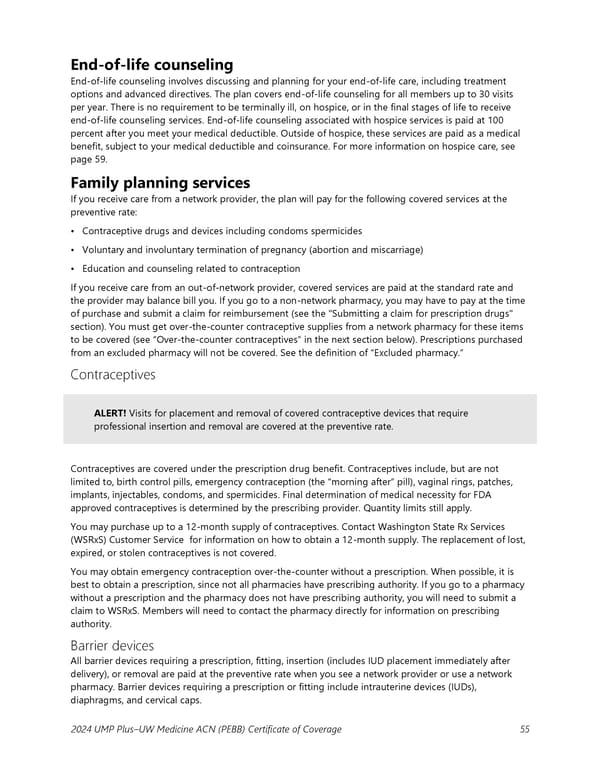End-of-life counseling End-of-life counseling involves discussing and planning for your end-of-life care, including treatment options and advanced directives. The plan covers end-of-life counseling for all members up to 30 visits per year. There is no requirement to be terminally ill, on hospice, or in the final stages of life to receive end-of-life counseling services. End-of-life counseling associated with hospice services is paid at 100 percent after you meet your medical deductible. Outside of hospice, these services are paid as a medical benefit, subject to your medical deductible and coinsurance. For more information on hospice care, see page 59. Family planning services If you receive care from a network provider, the plan will pay for the following covered services at the preventive rate: • Contraceptive drugs and devices including condoms spermicides • Voluntary and involuntary termination of pregnancy (abortion and miscarriage) • Education and counseling related to contraception If you receive care from an out-of-network provider, covered services are paid at the standard rate and the provider may balance bill you. If you go to a non-network pharmacy, you may have to pay at the time of purchase and submit a claim for reimbursement (see the "Submitting a claim for prescription drugs" section). You must get over-the-counter contraceptive supplies from a network pharmacy for these items to be covered (see “Over-the-counter contraceptives” in the next section below). Prescriptions purchased from an excluded pharmacy will not be covered. See the definition of “Excluded pharmacy.” Contraceptives ALERT! Visits for placement and removal of covered contraceptive devices that require professional insertion and removal are covered at the preventive rate. Contraceptives are covered under the prescription drug benefit. Contraceptives include, but are not limited to, birth control pills, emergency contraception (the “morning after” pill), vaginal rings, patches, implants, injectables, condoms, and spermicides. Final determination of medical necessity for FDA approved contraceptives is determined by the prescribing provider. Quantity limits still apply. You may purchase up to a 12-month supply of contraceptives. Contact Washington State Rx Services (WSRxS) Customer Service for information on how to obtain a 12-month supply. The replacement of lost, expired, or stolen contraceptives is not covered. You may obtain emergency contraception over-the-counter without a prescription. When possible, it is best to obtain a prescription, since not all pharmacies have prescribing authority. If you go to a pharmacy without a prescription and the pharmacy does not have prescribing authority, you will need to submit a claim to WSRxS. Members will need to contact the pharmacy directly for information on prescribing authority. Barrier devices All barrier devices requiring a prescription, fitting, insertion (includes IUD placement immediately after delivery), or removal are paid at the preventive rate when you see a network provider or use a network pharmacy. Barrier devices requiring a prescription or fitting include intrauterine devices (IUDs), diaphragms, and cervical caps. 2024 UMP Plus–UW Medicine ACN (PEBB) Certificate of Coverage 55
 UMP Plus–UW Medicine Accountable Care Network (UW Medicine ACN) COC (2024) Page 55 Page 57
UMP Plus–UW Medicine Accountable Care Network (UW Medicine ACN) COC (2024) Page 55 Page 57